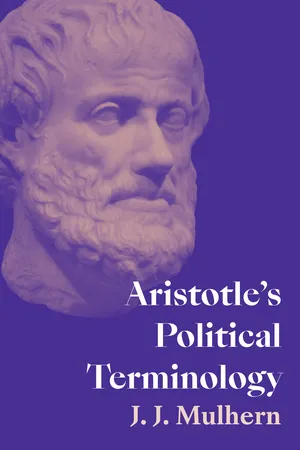
- English
- ePUB (mobile friendly)
- Available on iOS & Android
Aristotle's Political Terminology
About this book
Comprehensive examination of the different senses in which Aristotle uses a group of the most important expressions in his political writings, with the aim of making possible a firmer understanding of his positions.
Aristotle's Political Terminology offers a fresh approach to Aristotle's political thought by examining the language he uses in a more complete way than was possible before the appearance of the Thesaurus Linguae Graecae. It allows the reader to see clearly the difficulty scholars have had in commenting on and translating Aristotle's political works, which often ends in sharp differences among scholars who approach Aristotle with differing prior philosophical, political, historical, or ideological commitments. The book addresses eleven words and cognates or phrases that are fundamental to understanding Aristotle's text, many of them related to one another. They include the Greek expressions often translated, and sometimes mistranslated, by nature, property, constitution, and ideal. Helpful in teaching both undergraduate and graduate students, this work gives examples of Aristotle's uses of an expression in a defined universe, as in the case of the 522 occurrences in the Politics alone of the word often rendered by constitution, to give a flavor for how Aristotle might be read to avoid misimpressions. These examples sometimes are accompanied by tabular worksheets so that readers may check the author's work more easily. Further, the pages use transliteration in the main text, with a few mandatory exceptions, as in quoted titles of articles, so that readers whose Greek is not strong can follow the argument; the Greek text is provided in footnotes.
Frequently asked questions
- Essential is ideal for learners and professionals who enjoy exploring a wide range of subjects. Access the Essential Library with 800,000+ trusted titles and best-sellers across business, personal growth, and the humanities. Includes unlimited reading time and Standard Read Aloud voice.
- Complete: Perfect for advanced learners and researchers needing full, unrestricted access. Unlock 1.4M+ books across hundreds of subjects, including academic and specialized titles. The Complete Plan also includes advanced features like Premium Read Aloud and Research Assistant.
Please note we cannot support devices running on iOS 13 and Android 7 or earlier. Learn more about using the app.
Information
Table of contents
- Cover
- Title
- Copyright
- Contents
- Preface
- Introduction
- Chapter 1 Growth (Phusis and Phuō)
- Chapter 2 The Mature Dependent (Phusei Doulos)
- Chapter 3 Possessions (Ktēmata, Pol. 2.1260b27–1274b28)
- Chapter 4 Assessment (Timēma)
- Chapter 5 Making Claims (Amphisbētēsis, Enklēma, etc.)
- Chapter 6 Shared or Agreed Advantage (Koinēi Sumpheron)
- Chapter 7 The Citizen Without Qualification (Ton Haplōs Politēn, Pol. 3.1275a19)
- Chapter 8 Citizenship, Citizen Body, Constitution, and Regime (Politeia)
- Chapter 9 Lineage and Recognizable Configuration (Genos and Eidos)
- Chapter 10 Everywhere and Potency (Pantachou and Dunamis)
- Chapter 11 According to Prayer or Wish (Kat’ Euchēn)
- Epilogue
- Bibliography
- Index
- Index Locorum
- Back Cover